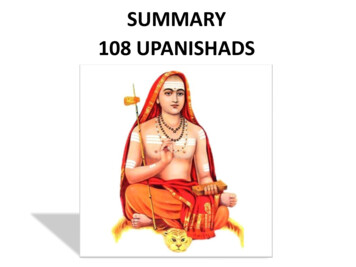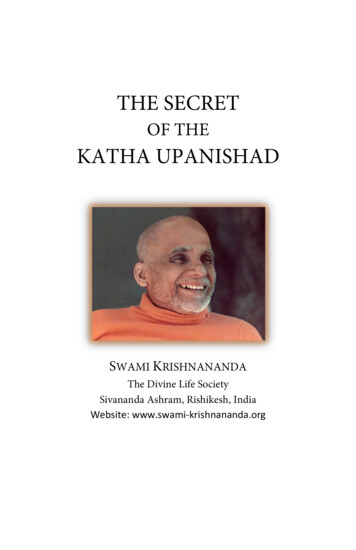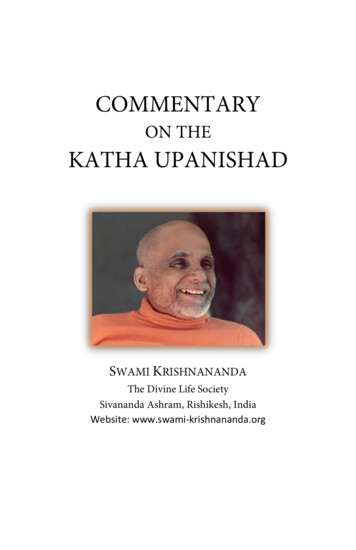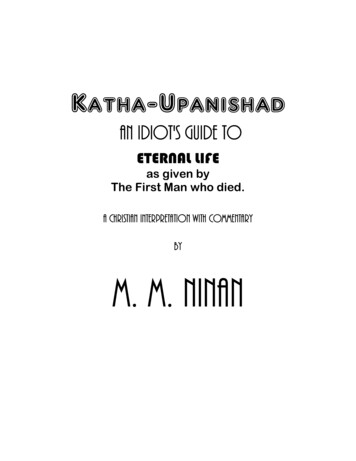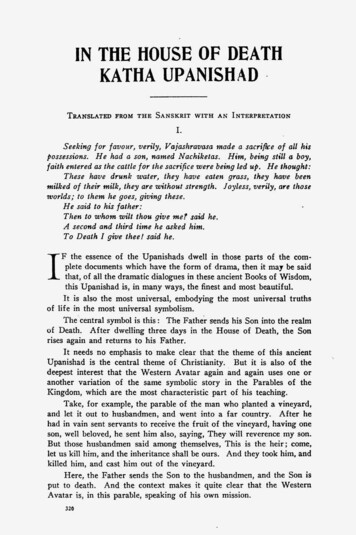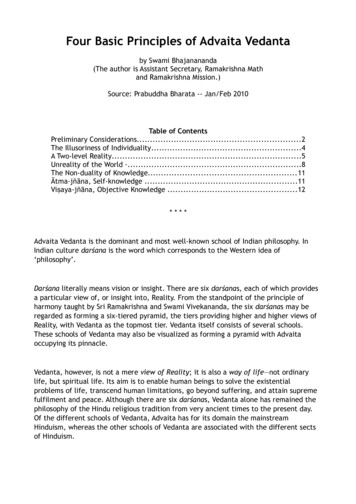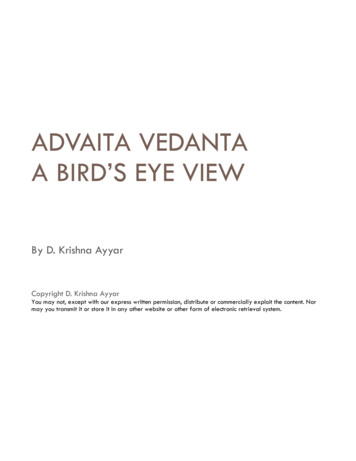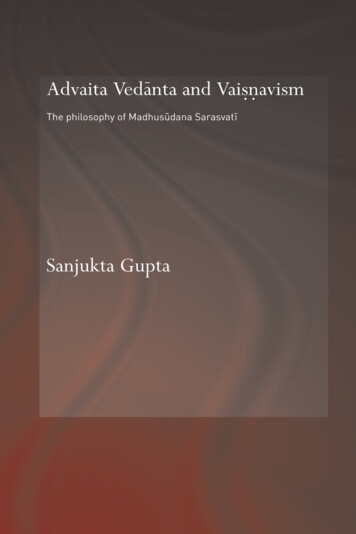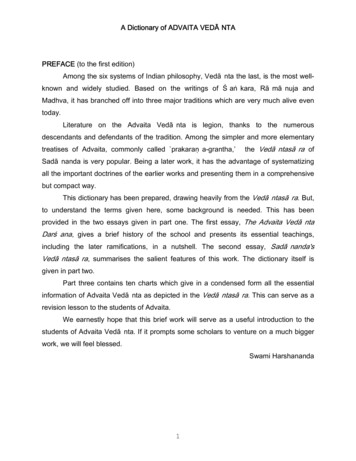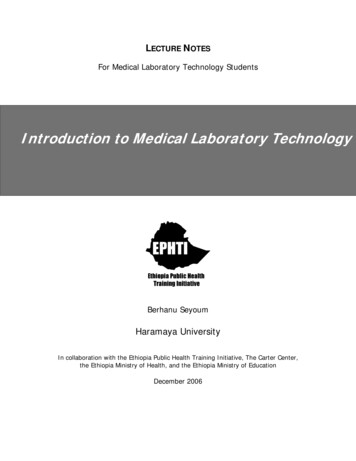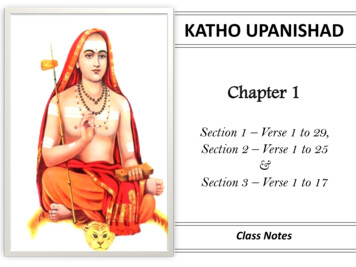
Transcription
KATHO UPANISHADChapter 1Section 1 – Verse 1 to 29,Section 2 – Verse 1 to 25&Section 3 – Verse 1 to 17Class Notes
INDEXS. No.TitlePage No.1.Introduction to Upanishad12.6 Means of Knowledge83.Principles of Knowledge94.Teaching is in Samaveda form, dialogue115.10 Upanishad126.Summary of Katho Upanishad137.Introduction148.Summary of Chapter 1 – Valli 1159.Summary of Chapter 1 – Valli 21810.Summary of Chapter 1 – Valli 32111.Summary of Chapter 22412.Summary of Chapter 2 – Valli 12513.Summary of Chapter 2 – Valli 22914.Summary of Chapter 2 – Valli 33415.Swami Tapovan Maharaj3716.Santi Mantra39[i]
S. No.TitlePage No.Chapter 1 – Valli 117.Introduction4518.Verse 14719.Verse 24720.Verse 34821.Verse 44822.Verse 54923.Verse 65024.Verse 75225.Verse 85326.Verse 95527.Verse 105528.Verse 115629.Verse 125730.Verse 135831.Verse 146032.Verse 1560[ii]
S. No.TitlePage No.33.Verse 166234.Verse 176335.Verse 186436.Verse 196537.Verse 206638.Verse 216839.Verse 227040.Verse 237141.Verse 247342.Verse 257443.Verse 267544.Verse 277745.Verse 287846.Verse 297947.Sadhana Chatustaya8148.Sat Sampatti Discipline82[iii]
S. No.TitlePage No.Chapter 1 – Valli 249.Summary8350.2 Margas in Vedanta8451.Verse 18552.Verse 28653.Verse 38954.Verse 49055.Verse 59156.Verse 69357.Verse 79558.Verse 89959.Verse 910260.Verse 1010461.Verse 1110562.Verse 1210663.Verse 1310864.Verse 14109[iv]
S. No.TitlePage No.65.Verse 1511066.Verse 1611367.Verse 1711468.Verse 1811569.Verse 1912070.Verse 2012471.Verse 2113172.Verse 2313473.Verse 2413674.Verse 25137Chapter 1 – Valli 375.Verse 113876.Verse 214477.Verse 314678.Verse 4151[v]
S. No.TitlePage No.79.Verse 515280.Verse 615581.Verse 715782.Verse 815983.Verse 916084.Verse 1016485.Verse 1117086.Verse 1217487.Verse 1317988.Verse 1418389.Verse 1518690.Verse 1618991.Verse 1718992.Summary – Chapter 119193.Verses for Introspection-94.Video Duration[vi]
IntroductionToUpanishads
Introduction To Upanishads1. Veda : Vidanti Chaturaha Purushartham Tat Prapti Upayinou Cha Yena Iti Veda. That scripture By which a Person can know all the Goals (Purushartas) and means ofattaining them is Veda. Ved from the Root ‘Vid’ is to know. Source of Knowledge from the lord, Apaurusheyam, for benefit of the Society. It is Sruti, heard by the Rishis with a Sattvic Mind.2.Vedas – 2 PortionsVeda PurvaVeda Anta- Karma Khanda- For Dharma, Artha, Kama- Focussed on Jiva’s Karmas- Jnana Khanda- For Moksha- Focuses on Paramatma SvarupamKahika KarmaVachika Karma- Body Dominant.- Rituals to fulfil desires- Putra, Pashu, Vitta- Verbal instrument dominant.- Parayanam- JapaManasa Karma- Mind Dominant- Upasanas- More difficult1
Karma Khanda – Iha / ParaLoka Karma PhalamUpadhi- Better instruments ofenjoyment.14 Lokas- Better environment.- 7 higher- 7 lowerTaittriya Upanishad :- Te ye satam Manushya Vishaya- Better objectsTaittriya Upanishad :The following is the enquiry concerning the Bliss (Brahmananda rasa). Suppose there be a youth, good, well versed in thescriptures, well disciplined, resolute and very strong; to him belongs all this earth full of wealth. This is one unit of humanbliss. This (unit of bliss) of man multiplied hundredfold is the bliss of human gandharvas – and this is also the bliss of one2well versed in the Vedas and who is free from desires. [II – VIII – 2]
3. Mundak Upanishad :Let a brahmana (an aspirant), after he has examined the worlds gained by Karma, acquire freedom from all desires,reflecting that nothing that is eternal can be gained by Karma. Let him, in order to obtain the knowledge of the eternal,take sacrificial fuel (Samit) in his hands and approach that preceptor alone who is well-versed in the Veda-s and isestablished in Brahman. [I – II – 12] Intelligent person Examines and studies Laukika and Veidika Karmas and notices 3Doshas of all Karma Phalams. Learns from others Experiences.3 DoshasDukha MishritatvamAtrupti KaratvamBandhakatvama) Dukha Mishritatvam : Worldly accomplishments give Sukham, but mixed with sorrow. No Unalloyed Joy. Compare with others, get stress and tension.3
3 eLossGita :Verily, the fruit that accrues to those men of little intelligenceis finite. The worshippers of the devas go to the devas but Mydevotees come to Me. [Chapter 7 – Verse 23] Nothing Sashvatam, Permanent in this Universe.b) Atrupti Karatvam : All accomplishments with finite efforts can produce finite results only.Mundak Upanishad :Undependable (frail) is this boat of Yajna, is said to be manned by eighteen supporters on whom depend the lowercremonials. Those ignorant persons who acclaim this as the highest, are subject, again and again, to old age and death.[I – II – 7] There is always one higher for everything. Dissatisfaction, Discontentment always in human life, no limit for human greed.4
There is always one higher for everything. Dissatisfaction, Discontentment always in human life, no limit for human greed.c) Bandhakatvam : First I am master, Desire is servant, more I enjoy Karma Phalam, I get used to them. Later they dictate terms, they become master. We travel from dependence to more dependence not to independence Number of things we require is more and moreGita :Among thousands of men, one perchance strives forperfection; even among those successful strivers, only oneperchance knows Me in essence. [Chapter 7 – Verse 3]Katho Upanishad :The self-existent (Brahma) created the senses with outgoing tendencies ; therefore, man beholds the external universeand not the internal Self (Atman). But only some wise man desirous of Immortality, with eyes averted (turned within andwith his senses turned away) from sensual objects, sees the Atman within. [II – I – 1]5
Very few understand all Karma Phalams are defective, endorsed with 3 Doshas. No defect free Goal in Karma Khanda. Vedanta deals with defect free goal, Pure happiness not happiness mixed withsorrow.Gita :But, the man who rejoices only in the Self, who is satisfiedwith the Self, who is content in the Self alone, for him verilythere is nothing (more) to be done. [Chapter 3 – Verse 17] I am Truptaha Asmi, full and complete, Independent, free. Goal : Brahaman, Moksha. Normally I don’t accept myself physically , sensorily, mentally, Intellectually. Am I defect free Brahaman as Upanishad declares or defective Jiva.Example :KarnaRadha Putra- Charioteers son- HumiliatingKunti Putra- Kshatriya- Can compete6
Kunti : You are a Kshatriya / Tat Tvam Asi. First : Viprayaya – Disbelief. Second : Sambhavana – Possible.Vedanta : Nothing to accomplish only to know and be free. Need Appropriate Instruments to gain knowledge.Pramanam/ InstrumentsJnanam- Eyes- Forms & Colours- Ears- Sound- Nose- Smell- Skin- Touch- Tongue- Taste- Vedas- Brahman7
6 Means of KnowledgePratyaksham- 5 Sense organs- Basic instrument ofknowledge from birth.UpamanamAnupalabdi- Comparison- Forest buffalo like villagebuffalo.- Know by Absence ofthings.- I see no pot in hand, nochair behind wall.- Abava not through senseorgans.AnumanamArthapatti- Not within Range ofsense organs.a) Hear Horn, infer car.b) See smoke, infer fireExample :- Roads flooded in themorning, presume – rainat night.Shabda-Verbal CommunicationLaukikaShastriyaVeda PurvaVeda Anta8
Principles of Knowledge :a) Knowledge requires Pramanam, instruments.b) Knowledge requires appropriate relevant knowledge.Pratyaksha : Only for objective knowledge. All sense organs turned outward, will objectify only external world. Observer can’t be observed through any microscope, Telescope. Inference, comparison, absence, presumption based on data from Pratyaksham. Inappropriate instrument for self knowledge.Yajnavalkya to Meitreyi : Observer can’t be observed.Brihadaranyaka Upanishad :9
Because when there is duality, as it were, then one smells something, one sees something, one hears something, onespeaks something, one thinks something, one knows somethings. (But) when to the knower of Brahman everything hasbecome the Self, then what should one smell and through what, what should one see and through what, what should onehear and through what, what should one speak and through what, what should one think and through what, what shouldone know and through what? Through what should one know That owing to which all this is known - through what, OMaitreyi, should one know the Knower? [II – IV – 14] Veda Purva deals with Anatma Lokas, Karma Phalams. Only Vedanta Shabda is Pramanam mirror for Atma Jnanam, subject, observer, AtmaSvarupam. Knowing Brahman is attaining Brahman, Unique Jnanam. In other fields, know first, attain later, process involved. In Jnana Khanda, know first by Sravanam, make knowledge Dridham by removing alldoubts and misconception about myself by Mananam and Nididhyasanam. Assimilated knowledge gives nourishment, transforms a person. Why Upanishad Jnanam is a Rahasyam, a secret?a) Requires prepared mind as an instrument to receive the knowledge.b) Not easy to find Srotriya Guru who has skill, in teaching.10
Teaching is in Samvada form, Dialogue jnavalkyaGuruYama DharmarajaAngiras6 DisciplesJanakaSishyanachiketa 4 Vedas had 1180 secondary branches Shakhas, each with one Upanishad. Now 108 Upanishads available containing the Sara of Upanishads. Shankara has written commentary on 10 Upanishads. Jivatama Paramatma Aikyam is central theme in all the 10 Upanishads. Brahma Satyam, Jagat Mithyam, Jeevo Braheiva Na Paraha. Methodology :Prakriya – Drk Drishaya Viveka, Sharira Traya Viveka, Panch Kosha Viveka, Baga TyagaLakshana.11
10 UpanishadsRigSama- Chandogya Upanishad- Keno Upanishad- Aitareya UpanishadYajur-Katho UpanishadTaittiriya UpanishadIsavasya UpanishadBrihadaranyaka UpanishadAtharvana- Mandukya Upanishad- Mundak Upanishad- Prasno Upanishad12
KATHO UPANISHADSummary
Katho Upanishad ( 2 Adhyayas – 119 Verses )Summary2 Chapters (119 Verses)Chapter I – 3 Vallis (71 Verses)Chapter II – 3 Vallis (48 Verses)Section ISection IISection IIISection ISection IISection III29 Verses25 Verses17 Verses15 Verses15 Verses18 Verses13
Introduction : Katho Upanishad belongs to Krishna Yajur Veda – Like Taittriya Upanishad,Svetasvatara Upanishad.S. No.UpanishadNo. Of Verses1.Mandukya Upanishad122.Isavasya Upanishad183.Amrthabindu Upanishad224.Kaivalya Upanishad255.Aitareya Upanishad336.Kena Upanishad357.Taittriya Upanishad528.Mundak Upanishad659.Prasno Upanishad6710.Svetasvataro Upanishad11311.Katho Upanishad11912.Brihadaranyaka Upanishad43413.Chandogya Upanishad627Total162214
Chapter 1 – Valli 1 (29 Verses)-Verses 1 - 9Verse 10 - 11Verse 20 - 29Story1st Boon3rd BoonGuru : Yama Dharma RajaSishya : 8 yearsFather : VajasravasVisvajityagaAll possessions given in CharityIn Anger, father utters to Nachiketa“I will send you to Yama”.- Nachiketa goes to Yama.- 3 Nights stays without food outside- 3 Boons given by YamaLessons : Important Value- Atiti Devo Bava, give properDakshina, Sradha in ritual, VakyaParipalanam.- Fathers peace ofmind.- Pitru Devo BavaVerse 12 - 192nd Boon- NaachiketaVishvarupa ritualand Upasana toreach Brahma Loka.- For Benefit ofSociety.- Atma – Jnanam- Yama testsNachiketa in Viveka,Vairagyam, SadhanaChatushtayaSampatti,Mumukshutvam.- Sense pleasuresperishable.- Dharma, Artha,Kama will leave.- Nachiketa repeatsword by word theritual.15
Important Mantras :Chapter 1 – 1 – 20 :There is that doubt. “When a man is dead,” Some say ‘He exist’ and some again say ‘He does not.’ this I should like toknow, being taught by thee. This is the third boon, that I ask. [I – I – 20] Third Boon – Asked by Nachiketa.Chapter 1 – 1 – 26 :Ephemeral these ; O! Death, these tend to decay, the fire (vigour) of all the senses in man. Even the longest life is indeedshort. Let thine alone be the chariots, the dance and the music. [I – I – 26] Pleasures seemingly good, capable of causing addiction, weakens will power, causes sorrow16
Chapter 1 – 1 – 27 :Man is not to be satisfied with wealth. Now that we have seen Thee, we shall surely get wealth. We shall also live, aslong as You rule. Therefore, that boon alone is fit to be craved for by me. [I – I – 27] Nobody gets contentment with money, No Trupti, Will ask for more and more,Compare with others. Self knowledge only mean for fulfillment, Satisfaction, Contentment.17
Chapter 1 – 2nd Valli (25 Verses)Verse 1 - 13- Glory of student,teacher, teaching.- Strovyaha, skill tocommunicate requiredto teach Atma Vidyawhere words fail.- Verse 1 – 2 – 7 :Sarvanaya’pi bahu - What you are searchingis in yourself, subjectivescience.- Verse 1 – 2 – 8 :Na narena-varena - Brahma Nishta.Verse 14- 3rd Boon Rephrased- Atma definitionVerse 15 - 17- Omkara Upasana toprepare mind.- Hiranyagarbha – totalmind.- Virat, gross universe.- Ishvara – SamashtiKarana Shariram.Verse 18, 19, 20, 25Atma Svarupam :1. Chaitanyam2. Nirivikaratvam3. Akartrutvam4. Aboktrutvam5. Sarva Adhishtanatvam6. Durvignatvam7. Desha Kala AteetatvamVerse 21 - 24- Qualification of student18
Important Mantras :a) Chapter 1 – 2 – 7 :“He (the Self) of whom many are not able even to hear ; the recipient (the pupil) many, even having heard of Him, do notcomprehend. Wonderful is a man (teacher), when found, who is able to teach the Self. Wonderful is he (the pupil) whocomprehends the Self, when taught by an able teacher.” [I – II – 7]b) Chapter 1 – 2 – 8 :“This (Self), when taught by a man of inferior intellect, is not easy to be known, as it is to be thought of in various ways.But when it taught by another (superior) perceptor who is one with Brahman (who beholds no difference), there is no(other) way concerning it. The Self being subtler than the subtlest and is beyond argumentation.” [I – II – 8]c) Chapter 1 – 2 – 18 :“The intelligent Atman is not born, nor does He die. He did not spring from anything, and nothing sprang from him.
06.10.2018 · Katho Upanishad belongs to Krishna Yajur Veda – Like Taittriya Upanishad, Svetasvatara Upanishad. S. No. Upanishad No. Of Verses 1. Mandukya Upanishad 12 2. Isavasya Upanishad 18 3. Amrthabindu Upanishad 22 4. Kaivalya Upanishad 25 5. Aitareya Upanishad 33 6. Kena Upanishad 35 7. Taittriya Upanishad 52 8. Mundak Upanishad 65 9. Prasno Upanishad 67 10. Svetasvataro Upanishad
